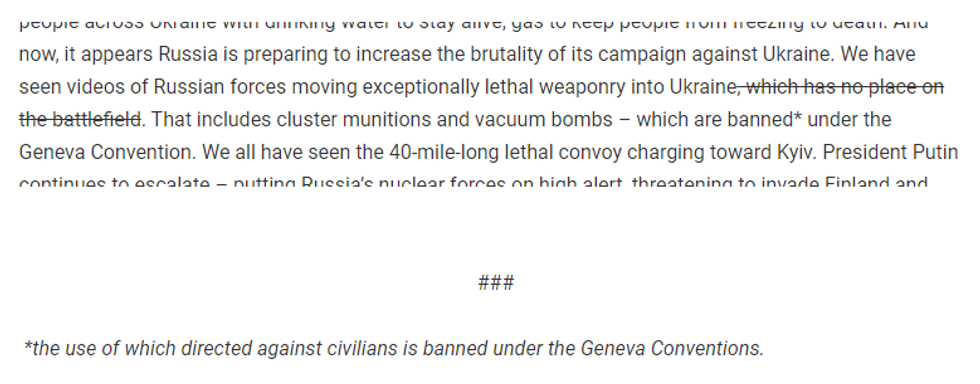In an impassioned address Wednesday at a special United Nations meeting on Ukraine, U.S. Ambassador Linda Thomas-Greenfield drew attention to “videos of Russian forces moving exceptionally lethal weaponry into Ukraine, which has no place on the battlefield. That includes cluster munitions.” These weapons, which are notorious for leaving small bomblets behind that later kill and injure civilians, are one of a small number of indiscriminate weapons that have infamous global recognition as markers of the horror of war — recently also used in Azerbaijan and Nagorno-Karabakh, as well as Syria, garnering international disgust.
As many human rights groups are now doing, the United States was right to point to cluster munitions in criticizing Russia. However, within hours of Ambassador Thomas-Greenfield’s comments, the U.S. Mission to the United Nations edited the transcript, striking out that the weapons have no place on the battlefield, as indicated below.
The new formulation, which only expresses concern if these weapons are “directed against civilians,” undermines U.S. opprobrium of Russian behavior. So too does the fact that the United States has refused to abandon cluster munitions — despite functionally not using the weapons itself in nearly two decades and no longer having a domestic manufacturer of them.
Today, 110 countries, including more than two-thirds of NATO member states, are parties to the Convention on Cluster Munitions, which bans the weapons. The United States worked against the creation of the Convention, and continues to eschew its meetings. By doing so, Washington keeps itself outside the growing norm that it could use more fully to condemn Russian aggression.
Tragically, cluster munitions are not the only weapons the United States is clinging to that undermine its ability to call Russia, and others, to account. In his State of the Union address Tuesday night, President Biden referred to “the battle between democracy and autocracies,” framing Ukraine as the stand-in for democracy and Russia for autocracy. He would be wise to heed that framing when it comes to landmines.
In the face of an existential threat to its existence, Ukraine appears to be honoring its commitment under the Mine Ban Treaty not to use victim-activated antipersonnel landmines –—weapons that primarily maim and killed civilians. In addition to Ukraine, that treaty is supported by 163 more countries, including the vast majority of the world’s democracies and every NATO member state — aside from the United States.
In April 2021 Ambassador Thomas-Greenfield said the president wanted to “curtail the use of landmines.” Still, it has yet to change Trump era policy that would allow for the use of them anywhere in the world. Nor has this administration indicated it will move to join the treaty — a decision it could announce now, acknowledging inspiration from Ukraine.
Instead, the United States remains one of the few countries rejecting the Mine Ban Treaty — joining many of the same autocracies and other nations Secretary of State Antony Blinken excoriated in a speech to the Human Rights Council on Tuesday in defense of Ukraine, including China, Iran, Mynamar, Russia, and Syria.
U.S. refusal to abandon cluster munitions and landmines is part of a larger challenge faced by this country that too frequently resists new international initiatives to limit military behavior — whether that be using explosive weapons in populated areas or creating lethal autonomous weapons. This moment should be one that inspires change.
Ambassador Thomas-Greenfield’s correct criticism Wednesday of Russia for “destroying critical infrastructure” in Ukraine through “brazen and indiscriminate” attacks should push the United States to support the emerging political declaration on protecting civilians in urban warfare, rather than maintaining that implementation of existing law is sufficient. It is clearly failing in Ukraine.
The United States should also look to welcome, rather than resist, a binding agreement that would keep machines from making kill decisions. The possibility of abuse of such weapons, especially by autocratic regimes, is one of many reasons to ban so-called killer robots.
If the president and his officials, as espoused in speeches this week and more broadly through the Summit for Democracy efforts, want to truly draw a distinction between democracies and autocracies, they must look to which weapons the United States allows to be used and how it approaches war. Clinging to weapons such as landmines and cluster munitions, and not fully supporting the development of commitments to protect civilians and humanity, weakens that distinction and the ability to reject military aggression such as that Russia is inflicting on Ukraine and its people today.

















